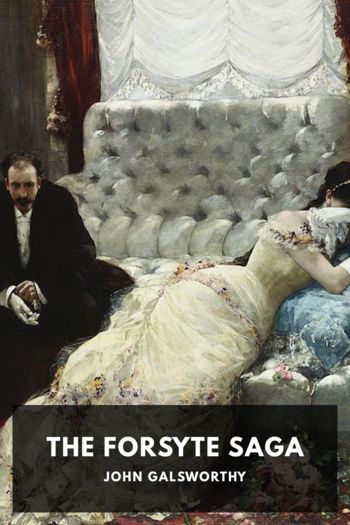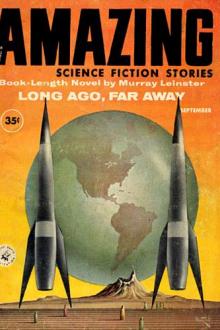The Forsyte Saga - John Galsworthy (best english novels for beginners .txt) 📗

- Author: John Galsworthy
Book online «The Forsyte Saga - John Galsworthy (best english novels for beginners .txt) 📗». Author John Galsworthy
Something in his face and attitude touched young Jolyon. He knew what suffering was like, and this man looked as if he were suffering.
He got up and touched his arm.
Bosinney started, but exhibited no sign of embarrassment on seeing who it was.
Young Jolyon sat down.
“I haven’t seen you for a long time,” he said. “How are you getting on with my cousin’s house?”
“It’ll be finished in about a week.”
“I congratulate you!”
“Thanks—I don’t know that it’s much of a subject for congratulation.”
“No?” queried young Jolyon; “I should have thought you’d be glad to get a long job like that off your hands; but I suppose you feel it much as I do when I part with a picture—a sort of child?”
He looked kindly at Bosinney.
“Yes,” said the latter more cordially, “it goes out from you and there’s an end of it. I didn’t know you painted.”
“Only watercolours; I can’t say I believe in my work.”
“Don’t believe in it? There—how can you do it? Work’s no use unless you believe in it!”
“Good,” said young Jolyon; “it’s exactly what I’ve always said. By the by, have you noticed that whenever one says ‘Good,’ one always adds ‘it’s exactly what I’ve always said.’ But if you ask me how I do it, I answer, because I’m a Forsyte.”
“A Forsyte! I never thought of you as one!”
“A Forsyte,” replied young Jolyon, “is not an uncommon animal. There are hundreds among the members of this Club. Hundreds out there in the streets; you meet them wherever you go!”
“And how do you tell them, may I ask?” said Bosinney.
“By their sense of property. A Forsyte takes a practical—one might say a commonsense—view of things, and a practical view of things is based fundamentally on a sense of property. A Forsyte, you will notice, never gives himself away.”
“Joking?”
Young Jolyon’s eye twinkled.
“Not much. As a Forsyte myself, I have no business to talk. But I’m a kind of thoroughbred mongrel; now, there’s no mistaking you: You’re as different from me as I am from my Uncle James, who is the perfect specimen of a Forsyte. His sense of property is extreme, while you have practically none. Without me in between, you would seem like a different species. I’m the missing link. We are, of course, all of us the slaves of property, and I admit that it’s a question of degree, but what I call a ‘Forsyte’ is a man who is decidedly more than less a slave of property. He knows a good thing, he knows a safe thing, and his grip on property—it doesn’t matter whether it be wives, houses, money, or reputation—is his hallmark.”
“Ah!” murmured Bosinney. “You should patent the word.”
“I should like,” said young Jolyon, “to lecture on it:
“Properties and quality of a Forsyte: This little animal, disturbed by the ridicule of his own sort, is unaffected in his motions by the laughter of strange creatures (you or I). Hereditarily disposed to myopia, he recognises only the persons of his own species, amongst which he passes an existence of competitive tranquillity.”
“You talk of them,” said Bosinney, “as if they were half England.”
“They are,” repeated young Jolyon, “half England, and the better half, too, the safe half, the three percent half, the half that counts. It’s their wealth and security that makes everything possible; makes your art possible, makes literature, science, even religion, possible. Without Forsytes, who believe in none of these things, and habitats but turn them all to use, where should we be? My dear sir, the Forsytes are the middlemen, the commercials, the pillars of society, the cornerstones of convention; everything that is admirable!”
“I don’t know whether I catch your drift,” said Bosinney, “but I fancy there are plenty of Forsytes, as you call them, in my profession.”
“Certainly,” replied young Jolyon. “The great majority of architects, painters, or writers have no principles, like any other Forsytes. Art, literature, religion, survive by virtue of the few cranks who really believe in such things, and the many Forsytes who make a commercial use of them. At a low estimate, three-fourths of our Royal Academicians are Forsytes, seven-eighths of our novelists, a large proportion of the press. Of science I can’t speak; they are magnificently represented in religion; in the House of Commons perhaps more numerous than anywhere; the aristocracy speaks for itself. But I’m not laughing. It is dangerous to go against the majority—and what a majority!” He fixed his eyes on Bosinney: “It’s dangerous to let anything carry you away—a house, a picture, a—woman!”
They looked at each other.—And, as though he had done that which no Forsyte did—given himself away, young Jolyon drew into his shell. Bosinney broke the silence.
“Why do you take your own people as the type?” said he.
“My people,” replied young Jolyon, “are not very extreme, and they have their own private peculiarities, like every other family, but they possess in a remarkable degree those two qualities which are the real tests of a Forsyte—the power of never being able to give yourself up to anything soul and body, and the ‘sense of property.’ ”
Bosinney smiled: “How about the big one, for instance?”
“Do you mean Swithin?” asked young Jolyon. “Ah! in Swithin there’s something primeval still. The town and middle-class life haven’t digested him yet. All the old centuries of farm work and brute force have settled in him, and there they’ve stuck, for all he’s so distinguished.”
Bosinney seemed to ponder. “Well, you’ve hit your cousin Soames off to the life,” he said suddenly. “He’ll never blow his brains out.”
Young Jolyon shot at him a penetrating glance.
“No,” he said; “he won’t. That’s why he’s to be reckoned with. Look out for their grip! It’s easy to laugh, but don’t mistake me. It doesn’t do to despise a Forsyte; it doesn’t do to disregard them!”
“Yet you’ve done it yourself!”
Young Jolyon acknowledged the hit by losing his smile.
“You forget,” he said with a queer pride, “I can hold on, too—I’m a Forsyte myself. We’re all





Comments (0)